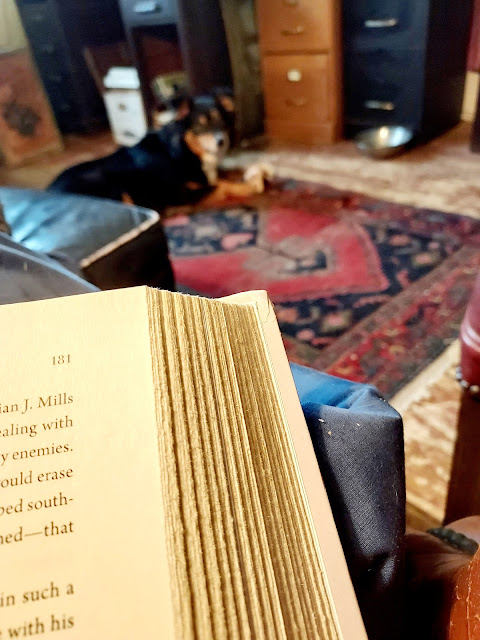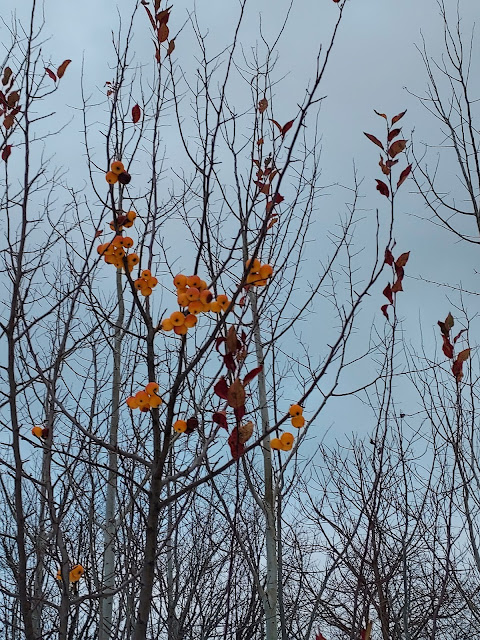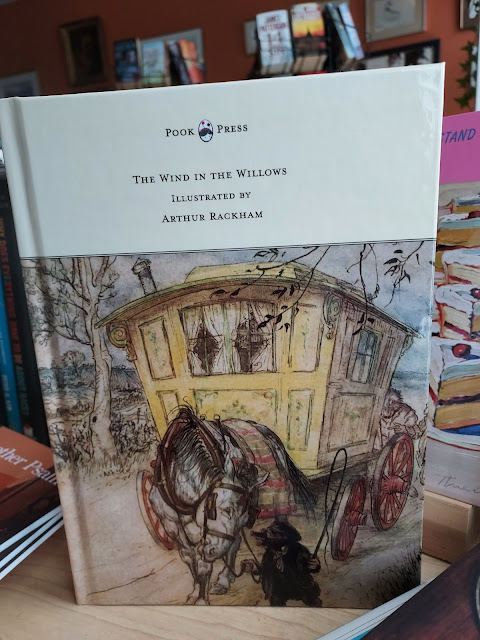“What kind of boat is she?”
An embarrassing question; for it was suddenly apparent that this small craft could not be classified. She was neither sailor nor steamer; she was not a trader, still less a yacht. A roof, the width of the beam, had been raised over a black, flat-bottomed hull; small square-paned windows had been cut in, and a short mast raised above. Space had been left in the bow for anchor and ropes; in the stern a tiny deck gave just enough room for the sweep of the tiller.
“She’s a—well—she’s a painter’s boat.”
The San Luca, by Cilette Ofaire, book’s title taken from the name of the boat in the travel narrative, was on a bookshelf I was looking through at home. I wondered why it hadn’t been on the shelf with the houseboat books, where I would have found it months ago when moving those books from living room to office. Although the “painter’s boat” was not exactly a houseboat, they did live aboard for years, the husband and wife, both of them painters. (It should really have been called a “painters’ boat,” with the apostrophe indicated plural artists.) In any case, the subject matter moved me to set aside a novel I’d planned to read at bedtime in favor of traveling aboard the ‘San Luca.’
They begin in Germany, with the plan of giving up cheap apartment hunting and the dreariness of even cheaper hotel rooms in the years following World War I, to take to Europe’s canals, living and working in their waterborne vessel.
Charles had found her in a partly drained canal in the dreary marshes bordering the Elbe between Hamburg and the sea. She made us think of a peddler’s booth abandoned after a fair, or a broken-down circus wagon left by the roadside. On her prow she had carried the carved wooden head of a dragon, set off by daubs of green and yellow, and along the sides of the hull had been painted wings which ended in a sort of tail vanishing into the rudder. We could not help smiling at her absurd, helpless air.
Charles and Cilette did not have Harlan and Anna Hubbard’s drifting voyage down the Ohio and Mississippi rivers. Sometimes they had an opportunity to moor in some lovely pastoral backwater, but just as often they were towed from one city to another in a long “train” of barges, a tugboat the motive engine of the train, past factories and cranes and sad little remnants of pathetic, bare-limbed trees. And in fact, being towed by some other vessel seemed their primary way of moving, from Germany to Czechoslovakia to Holland and beyond, in a world of customs officials, police, required permissions, and rules.
Intermission in Northport
I left my reading at the end of Part I to begin another day, first outdoors with dog and then indoors at bookshop. Part I of the story had ended sadly, with the suspicious disappearance of their little dog in Amsterdam, suspicious because neighbors on hand had complained about the boat being moored on “their” canal, and one had falsely claimed to the police that the quiet, sleeping dog “barked all night.”
After a couple of early customers, the shop settled down to a dead quiet until, one by one, friends trickled in. Even before being introduced to one another (those not already acquainted), lively conversation ensued. Books were purchased and ordered, recommendations made, questions asked, until the talk ranged far and wide from Waukazoo Street, ceasing only a few minutes after closing time. It was a good day in Northport. And the next day, Saturday, would be Independent Bookstore Day!
But first, back home to Sunny. In the rain. A short walk under an umbrella, dinner preparations, and then an hour of relaxation, the momma with her book, Sunny with her bone.
Back to the Boat
What a surprise awaited me at the beginning of Part II. Charles and Cilette sell their boat! Right in the middle of the book! The new owner, a friend of theirs, gives it a new name, and C&C purchase another boat and christen it ‘San Luca’ to continue their voyaging, now through Belgium and on to France.
Early in the story, we were told that Charles “knew how to create an atmosphere of intimacy out of the barest of materials” and thus transformed the droll, abandoned, dragon-headed boat into a waterborne home and studio to two wandering artists. Charles’s ingenuity is exercised once again on the new boat, a “lamentable figure” when first they see her, “streaked with rust” and further disfigured with “ugly red paint.” As soon as they found her,
…Charles began to draw up plans: taking her to pieces, putting her together again, modifying her to fit all our needs and our wishes.
“The entry here,” he said aloud, “will become the living-room.” He shut his eyes and Cilette knew that he was building the wall over in his dream.
 |
| The Artist's houseboat in Leland, Michigan! |
 |
| Daydream material |
 |
| Sketching a remodel.... |
Then Back in the Bookstore
On Saturday, April 26, the sun came out in Northport for Independent Bookstore Day!!! More importantly, probably, from a traditional Northport point of view, it was the day of the annual Scott Brow Fishing Derby for families of young children up at the millpond. Some people came for both books and fish, though, and that worked fine.
Discussing movies and TV series with a customer-friend from Cedar, I needed to check on the date of the 19th-century establishment of the town that became the ghost town where the Artist and I spent several contented winters. Imagine my horror, in looking up my own blog post from 2015, to discover that I had mistyped the date for the first Dos Cabezas post office! It was, of course, 1879, not 1979! All this time, and of all the people who had read that post (a popular one because of its subject matter), no one had corrected me! It’s kind of a hassle to make a correction to a post that far back in time, but I persisted until victory was mine.
Two dogs visited the bookshop on Saturday, Charlie and, later, another little dog about the same size but held in the owner’s arms. Friend Lucia also stopped by (though she had bought books only the day before) to wish me a Happy Indie Bookstore Day!
 |
| Always good to see Lucia! |
My bedtime book on Saturday was, once again, Ellen Airgood’s South of Superior, my go-to comfort book, the one that soothes my soul in troubled times and strengthens my resolve.
An excerpt from one of my favorite books
…It was hard to say who the “real” people were. She didn’t have anything against most of the new people, not the retirees or the summer people or tourists or even the snowmobilers, not on a case-by-case basis, except that they tended to expect too much, to assume too much. But they paid their taxes and kept their lawns mowed and volunteered at the school and spent money in the local stores and had as much right to be here as Gladys did, she realized that. And McAllaster had always been a tourist town, a resort town; her own parents had made a living off that fact.
But things were changing fast now. Too fast. Half a dozen new summer places got built on the beach every year, and no one was content with a regular house, everyone had to have a mansion. At this rate she wouldn’t be able to afford the taxes on the house she’d lived in for more than fifty years….
- Ellen Airgood, South of Superior
On the road!
Last time I went anywhere farther from home than Benzie or Grand Traverse County? Last fall I ventured all the way to Cadillac, and in late spring of 2024 I made it up to the U.P. once.
My spring road trip 2025 took me to Reed City, the halfway point a friend from Kalamazoo and I had chosen for this season’s rendez-vous.
 |
| Always good to see Laurie! |
We did no sight-seeing, and so I have no album of photographs to share, but I did stop to hover a few moments at a little farm village called Chase, where I mailed a postcard to a friend in the U.P. and used my phone to capture a couple of old buildings, the first because it must have been very important at one time in local history, the second because it made me think of how often I have meditated on hiding out in some out-of-the-way place where no one would ever find me. Why such an idea? Don’t you have occasional fantasies of leaving everything behind?
 |
| Faded glory |
 |
| No one would look for me here. |
Now, in closing, another excerpt
A somewhat strange book came into my hands. The title is King Noanett, the subtitle A Story of Old Virginia and the Masssachusetts Bay, the author’s name on the title page given as F. J. Stimson, but in parentheses below that J.S. of Dale. The main character is a young man of Devon, who meets a lass and falls in love – an old story, so far. This particular story, however, is set in the time of great conflict in England, and as the young man’s grandfather is a Parliamentarian and the young woman’s grandfather a royalist, the lovers are star-crossed. And here I must reveal that the young man’s unusual name is Bamfyde Moore Carew.
Let me here skip ahead in the story. Carew is convicted of giving aid to the royalists and sentenced to “transportation” (i.e., deportation to the colonies) and several years’ servitude (I forget how many), but eventually he and an Irishman who had shared the same transport vessel escape their masters and join an army. Horrors of slaughter and dissipation drive them from that life, also, and they carry away with them a girl whom neither of them wishes to marry (because the Irishman, like the Devon man, is in love with another) but whom they cannot leave to the life of the camp.
Enough of background. Of this convoluted story, I only want to leave you today with a speech the Irishman makes to his friend:
“Beauty is given man, the good kind of beauty to enjoy, the bad kind to tempt him and teach him strength. In this way even pleasure hath its place—and a Puritan is but a suicide that thrusts him, like a blubbering child, away from the fires that are to try him! Let monks renounce—a man is here to live, and touch and try the lives of others; to feel his life and use it to the full, and then to give it away—to the first cause, maybe? Men to be brave and true, maids to be brave and gentle—and both their highest duty to be kind.”
“Their highest duty to be kind.” Isn’t that a noble thought for the day?
 |
| Quietly spectacular hellebore |




























